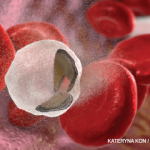“When they come to clinic, just add to your questions that you ask them: ‘Have you had any problems with infections or recurrent infections? Any problems with sinusitis this year?’ And what you find may surprise you,” Dr. Torgersen said.
IgG replacement can be used to give antibodies back to patients, helping patients with immune deficiency and autoimmunity.
B cell-targeted biologic therapies, such as anti-CD20 treatment, can be used to knock out or knock down B cell populations, typically not in the bone marrow but in the developing phases. Only one drug, bortezomib, destroys plasma cells, at least to a degree.
T Cell Compartment
The T cells are the generals that direct B cells to attack invaders. The assassin T cells are CD8-positive cytotoxic T cells that kill cells infected with such pathogens as viruses and fungi. And the psychologist T cells are regulatory cells that direct other immune cells and modulate their responses.
Patients lacking T cells are prone to recurrent or severe infections. Those lacking regulatory T cells, a disorder known as Ipex syndrome, tend to develop early-onset autoimmune disease.
T cell activity is tightly regulated by checkpoint inhibitors that block inhibitory receptors, such as programmed cell death-1 (PD-1) and cytotoxic T-lymphocyte-associated protein 4 (CTLA-4); as well as drugs, such as JAK inhibitors, which interfere with the activity of interleukin 2.
But there is a flip side to the anti-cancer effects of checkpoint inhibition, he said.
“If you’re like us, you’re beginning to see patients who’ve been treated with these checkpoint inhibitors for their cancers who now develop bad autoimmune disease,” he said. “When you block these two signals [PD1 and CTLA-4], it just allows T cells to go crazy and to attack cancer and to make autoimmunity.”
Thomas R. Collins is a freelance writer living in South Florida.
